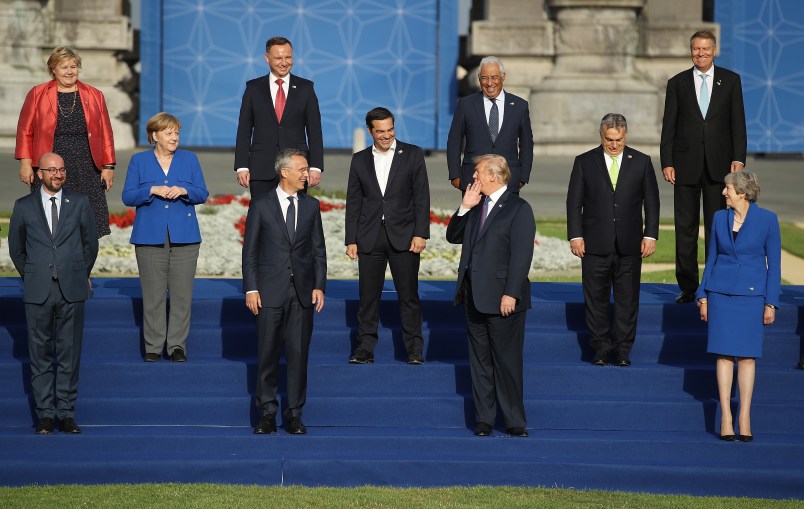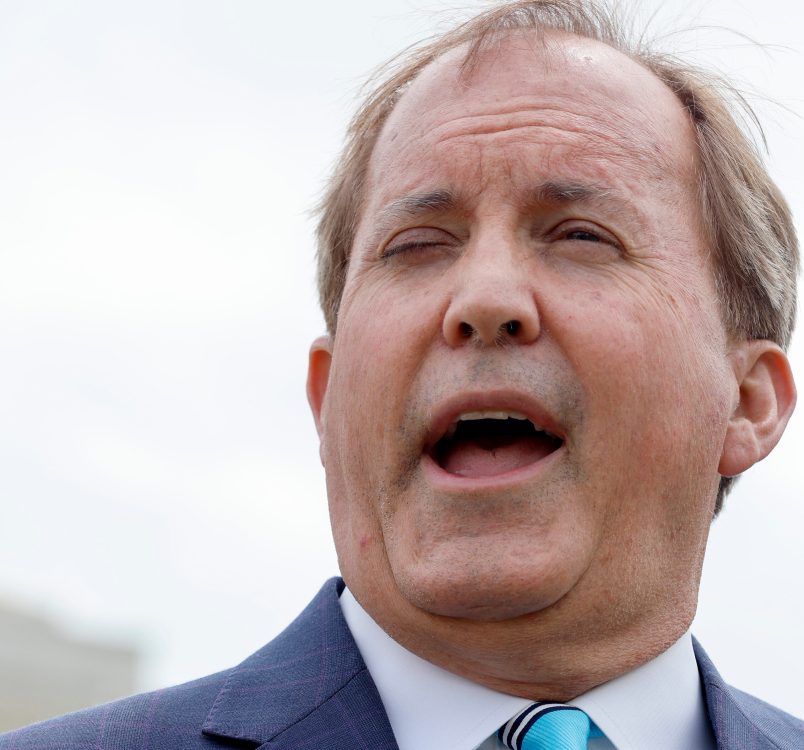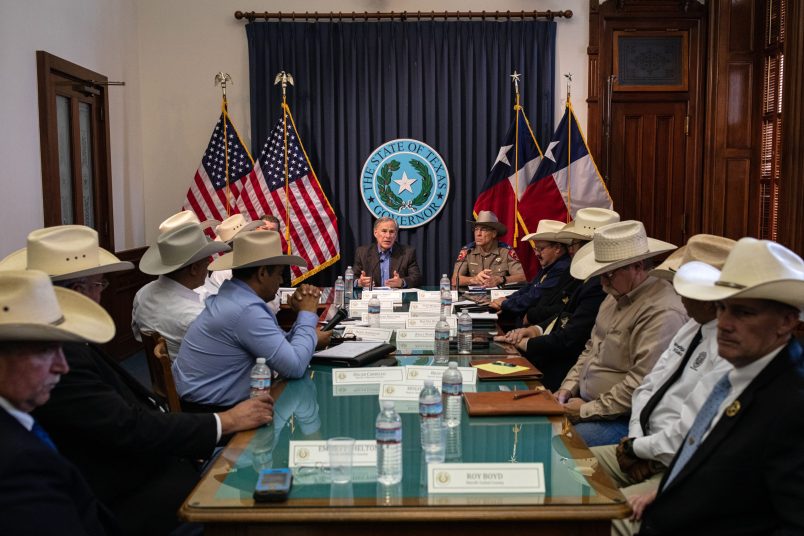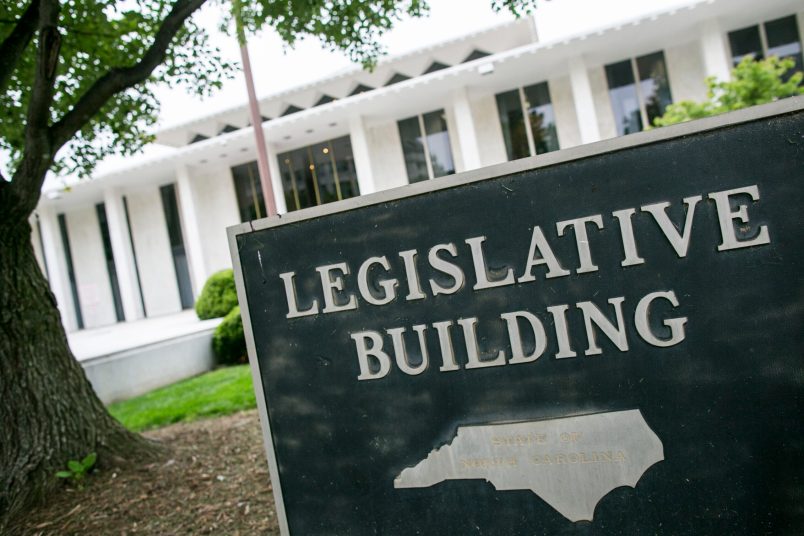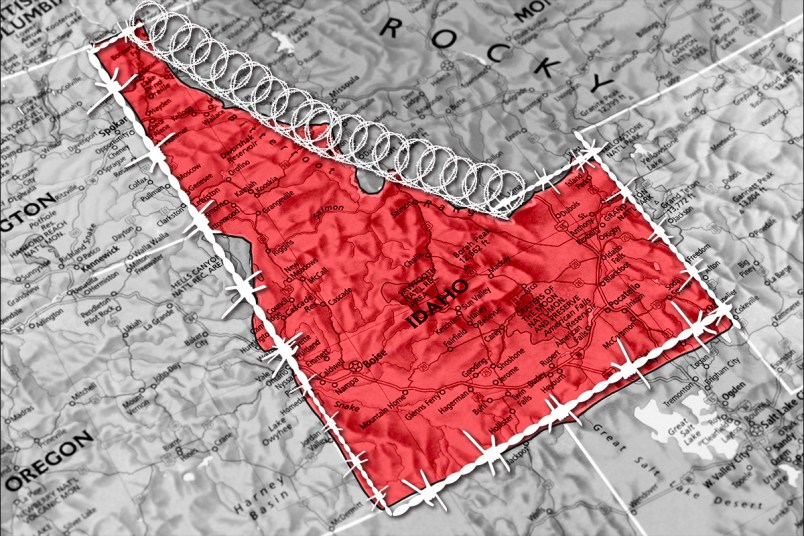The last time President Donald Trump interacted with some of the United States’ closest allies, he was busy dismissing a joint communique and lambasting Canadian PM Justin Trudeau as “dishonest and very weak.”
Given Trump’s topsy-turvy approach to foreign policy, U.S. allies could be forgiven for holding a guise of apprehension heading into this week’s NATO summit in Brussels, Belgium. While allies braced for Trump’s impending outbursts on defense spending, Trump surprised the group of leaders by breaking with his precedent and signing the 23-page NATO declaration.
But in the hours since his overseas romp began, he has already spurred plenty of controversy.
He suggested Germany is “captive to Russia”
In a fiery-on camera exchange Wednesday — a clip of which Trump tweeted to his own timeline — Trump tore into NATO Secretary General Jens Stoltenberg and made a dramatic rebuke of Germany for a pipeline oil deal its brokered with Russia.
“Germany, as far as I’m concerned, is captive to Russia because it’s getting so much of its energy from Russia,” Trump said during a breakfast with NATO leaders that was intended to serve as a mild introduction to closed door negotiations. “We have to talk about the billions and billions of dollars being paid to the country we’re supposed to be protecting you against.”
Here’s a video of the awkward exchange (be sure to keep an eye on Chief of Staff John Kelly’s expression):
Bilateral Breakfast with NATO Secretary General in Brussels, Belgium… pic.twitter.com/l0EP3lzhCM
— Donald J. Trump (@realDonaldTrump) July 11, 2018
German Chancellor Angela Merkel publicly took the insult with grace: “I myself experienced that a part of Germany that was controlled by the Soviet Union, and I am very happy today that we are united in freedom as the Federal Republic of Germany. We decide our own policies and make our own decisions.”
Behind closed doors, she told the 28 other NATO leaders about how Russian President Vladimir Putin had been a KGB spy in her own country, according to The Washington Post.
Allies should pay-up, and then some
As predicted, Trump could not resist blistering his colleagues for not yet contributing 2 percent of their nation’s gross domestic product to military defense– a goal that was established in 2014 and was meant to be carried out fully by 2024.
And he took it one step further, taking his closest allies to task over what he views as an imbalanced system that harms the U.S. (the U.S. spent 3.6 percent on defense last year). He called on the other world leaders to increase spending to 4 percent.
“President Trump wants to see our allies share more of the burden and at a very minimum meet their already stated obligations,” press secretary Sarah Huckabee Sanders told reporters in a statement Wednesday.
Trump found a way to skirt the no-Twitter rule
As the leader of the free world who habitually announces policy and makes news via his personal Twitter account, it’s not surprising that Trump found a way to tweet, even from the confines of a cellphone-banned room where signals are intentionally congested to prevent hacks.
While he was supposed to be in the meeting with the 29 NATO leaders this afternoon, his account sent out a message to U.S. farmers to quash their fears over the trade war that he created.
I am in Brussels, but always thinking about our farmers. Soy beans fell 50% from 2012 to my election. Farmers have done poorly for 15 years. Other countries’ trade barriers and tariffs have been destroying their businesses. I will open…
— Donald J. Trump (@realDonaldTrump) July 11, 2018
…things up, better than ever before, but it can’t go too quickly. I am fighting for a level playing field for our farmers, and will win!
— Donald J. Trump (@realDonaldTrump) July 11, 2018
As the New York Times notes, it’s unclear whether Trump broke NATO’s no-phone-zone rule or if he had an aide send out the tweet for him. Trump’s social media aide, Dan Scavino, regularly posts tweets on the President’s behalf.
Hey, he warned you
NATO allies could have predicted that Trump would ask to increase ally defense spending if they had decoded his tweets en route to the summit. In true Trump form, he tweeted that the 2 percent contribution was far too low and wondered aloud whether his closest allies would consider reimbursing the U.S. for years of what he perceives to be unbalanced spending. He also saw it it fit to throw in a quick jab at Europe’s (false) trade deficit with the U.S.
Many countries in NATO, which we are expected to defend, are not only short of their current commitment of 2% (which is low), but are also delinquent for many years in payments that have not been made. Will they reimburse the U.S.?
— Donald J. Trump (@realDonaldTrump) July 10, 2018
The European Union makes it impossible for our farmers and workers and companies to do business in Europe (U.S. has a $151 Billion trade deficit), and then they want us to happily defend them through NATO, and nicely pay for it. Just doesn’t work!
— Donald J. Trump (@realDonaldTrump) July 10, 2018
Meeting with Putin will be “easier” than facing US allies
The pressure of having his campaign under investigation for colluding with the Russian government to win the 2016 election clearly hasn’t been enough of a roadblock to deter the President from getting cozy with — or praising — Putin. Before boarding the plane to Brussels on Tuesday, Trump confided in reporters that he couldn’t quite label the Russian president as a friend or a foe. He settled on calling him a “competitor,” before admitting that he was most looking forward to his meeting with the Kremlin leader.
“I think Putin may be the easiest of them all,” he said.


